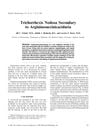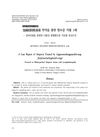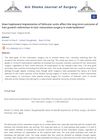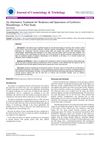 305 citations,
February 2007 in “Hormone and metabolic research”
305 citations,
February 2007 in “Hormone and metabolic research” Human skin makes sexual hormones that affect hair growth, skin health, and healing; too much can cause acne and hair loss, while treatments can manage these conditions.
 33 citations,
January 2007 in “Pediatric dermatology”
33 citations,
January 2007 in “Pediatric dermatology” Hair thinning and loss in a girl with a rare metabolic disorder was linked to her condition.
[object Object]  3 citations,
May 2018 in “Journal of nutritional health & food science”
3 citations,
May 2018 in “Journal of nutritional health & food science” Nutritional supplements can help manage hair loss and promote hair growth by strengthening hair roots and countering harmful effects of pollution, smoking, and deficiencies in vitamins and minerals.
 3 citations,
February 2014 in “The Journal of Korean Medicine Ophthalmology and Otolaryngology and Dermatology”
3 citations,
February 2014 in “The Journal of Korean Medicine Ophthalmology and Otolaryngology and Dermatology” Herbal medicine and acupuncture helped regrow hair and reduce pain in a patient with Alopecia Areata.

Nanocarriers with plant extracts show promise for safe and effective hair growth treatment.
 October 2012 in “Ain-Shams Journal of Surgery”
October 2012 in “Ain-Shams Journal of Surgery” The direction of hair implants doesn't affect the final direction of hair growth in baldness treatments.
September 2022 in “Cosmetics”  4 citations,
July 2022 in “Clinical and Experimental Dermatology”
4 citations,
July 2022 in “Clinical and Experimental Dermatology” Using more than 5% minoxidil can help hair growth more, but results vary and side effects may increase.
 11 citations,
May 2009 in “Medical Hypotheses”
11 citations,
May 2009 in “Medical Hypotheses” Male pattern baldness is an unintended side effect of the body's use of androgens for muscle growth, especially in those genetically prone to it.
179 citations,
June 2000 in “The American journal of pathology” The absence of functional sebaceous glands causes hair follicle destruction and scarring alopecia.
[object Object]  June 2023 in “Medical records-international medical journal”
June 2023 in “Medical records-international medical journal” Decreased IGF-1R expression may contribute to sacrococcygeal pilonidal sinus development.
 November 2021 in “International Journal of Immunology and Microbiology”
November 2021 in “International Journal of Immunology and Microbiology” Thyroid hormone imbalances can cause hair loss in alopecia patients.
22 citations,
March 2017 in “Journal of the Formosan Medical Association” The guidelines help doctors manage skin problems from certain cancer treatments to improve patients' lives.
 March 2021 in “Mansoura Veterinary Medical Journal /Mansoura Veterinary Medical Journal”
March 2021 in “Mansoura Veterinary Medical Journal /Mansoura Veterinary Medical Journal” Ringworm is a common, contagious fungal infection in dogs that can spread to humans and requires lengthy treatment.
 17 citations,
November 2012 in “Maturitas”
17 citations,
November 2012 in “Maturitas” The conclusion is that proper evaluation and treatment of hair loss in midlife women is important, considering the emotional impact and potential for various treatments.
 July 2024 in “Annals of Phytomedicine An International Journal”
July 2024 in “Annals of Phytomedicine An International Journal” Herbal ingredients like aloe vera and hibiscus can help with hair problems like hair loss and dandruff.
 59 citations,
February 2012 in “Journal of Dermatological Science”
59 citations,
February 2012 in “Journal of Dermatological Science” Environmental factors at different levels control hair stem cell activity, which could lead to new hair growth and alopecia treatments.
 17 citations,
January 2010 in “PubMed”
17 citations,
January 2010 in “PubMed” Optimal storage solutions and effective additives are crucial for improving the survival of hair transplant grafts.
 May 2015 in “Journal of Dermatological Science”
May 2015 in “Journal of Dermatological Science” Researchers found a new area on chromosome 2 linked to a genetic hair loss condition.
 45 citations,
August 2019 in “Dermatologic Therapy”
45 citations,
August 2019 in “Dermatologic Therapy” Hair loss treatments work better with lifestyle changes.
10 citations,
April 2020 in “PloS one” Lack of Crif1 in hair follicle stem cells slows down hair growth in mice.
 23 citations,
October 2018 in “Expert Opinion on Drug Safety”
23 citations,
October 2018 in “Expert Opinion on Drug Safety” Consider benefits and risks of new alopecia treatments for safety.
235 citations,
July 1999 in “Journal of biological chemistry/The Journal of biological chemistry” Human hair is made up of different keratins, some strong and some weak, with specific types appearing at various stages of hair growth.
 2 citations,
August 2019 in “International Journal of Cosmetic Science”
2 citations,
August 2019 in “International Journal of Cosmetic Science” Older age and certain lifestyles are linked to thinner, weaker hair, while how you see your hair relates to its thickness.
 January 2015 in “Journal of cosmetology & trichology”
January 2015 in “Journal of cosmetology & trichology” Mesotherapy might help make eyebrows thicker and darker for some people.
 15 citations,
January 2016 in “Przeglad Menopauzalny”
15 citations,
January 2016 in “Przeglad Menopauzalny” Eating a balanced diet with specific nutrients is important for menopausal women to manage hair loss.
 143 citations,
October 1996 in “Dermatologic Clinics”
143 citations,
October 1996 in “Dermatologic Clinics” Too much androgen can cause hair loss; finasteride may help.
 64 citations,
March 2005 in “Journal of Investigative Dermatology”
64 citations,
March 2005 in “Journal of Investigative Dermatology” Brain-Derived Neurotrophic Factor (BDNF) slows down hair growth and promotes hair follicle regression.
 54 citations,
September 2000 in “Archives of dermatology”
54 citations,
September 2000 in “Archives of dermatology” A hair-straightening product caused widespread hair loss and scalp injuries, mainly affecting African American women.
 41 citations,
November 2011 in “The Journal of Dermatology”
41 citations,
November 2011 in “The Journal of Dermatology” Some hair loss disorders are caused by genetic mutations affecting hair growth.

























